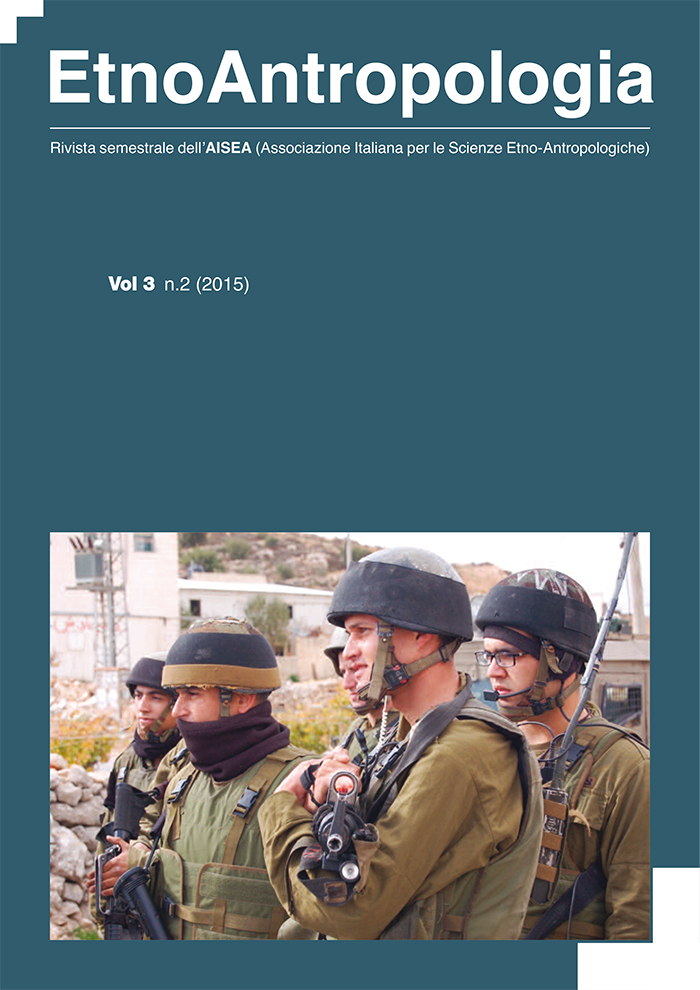«La política es winka, la historia es mapuche». Alleanze, conflitti e trasformazioni all’interno della pratica politica mapuche
DOI:
https://doi.org/10.1473/193Parole chiave:
Mapuche, Chile, cosmopolitics, land, class struggleAbstract
The struggles for the land of the '70s saw the alliance between the Mapuche communities and the Chilean left in a "class struggle" in which the indigenous society was included within the general category of campesinos. This process was brutally interrupted by the coup of Pinochet, whose violent repression has contributed to reshape the contraposition according to the previous axis Mapuche-winka (non-Mapuche). Also as a consequence of these tensions, the current Mapuche movement is based on the ideas of self-determination and recovery of the ancestral territory, constituting as a particular "cosmopolitics" that seems to distance itself both from the Western political conception, and from the previous alliance with the Chilean left. The present paper compares the two moments through the analysis of the indigenous leader’s narrative, aiming at understanding the transformations of the Mapuche political practice and its dialectical relationship with the Chilean Other.
Riferimenti bibliografici
Bengoa J. 2000, La Emergencia Indígena en América Latina, Santiago: Fondo de Cultura Económica.
— 2008, Historia de el Pueblo Mapuche, Santiago: LOM. [I ed. 1985]
Blaser M. 2004, Indígenas del Chaco Paraguayo: Proyectos de Vida o Proyectos de Desarrollo?, «Suplemento Antropológico», 39(1): 193–229.
— 2009, The Threat of the Yrmo: The Political Ontology of a Sustainable Hunting Program, «American Anthropologist», 111(1): 10–20.
Bonifacio V. 2013a, Building up the collective: a critical assessment of the relationship between indigenous organizations and international cooperation in the Paraguayan Chaco, «Social Anthropology», 21(4): 510–522.
— 2013b, Meeting the Generals: A Political Ontology Analysis of the Paraguayan Maskoy Struggle for Land, «Anthropologica», 55: 385–398.
Correa M., Mella E. 2010, Las razone del Ilkun/Enojo. Memoria, despojo y criminalización en el territorio mapuche de Malleco, Santiago: LOM.
Correa M., Molina R., Yáñez N. 2005, La Reforma agraria y las tierras mapuche. Chile 1962-1975, Santiago: LOM.
De la Cadena M. 2010, Indigenous Cosmopolitics in the Andes. Conceptual Reflections beyond Politics, «Cultural Anthropology», 25(2): 334–370.
Foerster R., Mortecino S. 1988, Organizaciones, líderes y contiendas mapuches (1900-1970), Santiago: Ceam ediciones.
Latour B. 1993, We Have Never Been Modern, Cambridge: Harvard University Press.
Le Bonniec F. 2009, Reconstrucción de la territorialidad mapuche en el Chile contemporáneo. Un acercamiento necesario desde la historia y la etnografía, in Calbucura J., Le Bonniec F. 2009, Territorio y territorialidad en contexto post-colonial. Estado de Chile - Nación Mapuche, Ñuke Mapuförlaget, 44-79.
Mallon F., 2004, La sangre del Copihue. La comunidad Mapuche de Nicolás Ailío y el Estado chileno 1906-2001, Santiago: LOM.
Mella E. 2007, Los mapuche ante la justicia. La criminalización de la protesta indígena en Chile, Santiago: LOM.
Marimán P., Caniuqueo S., Millalén J., Levil R., 2006, Escucha Winka! Cuatro Ensayos de Historia Nacional Mapuche y un epilogo sobre el futuro, Santiago: LOM.
Morales R. 1999, Cultura Mapuche y Represión en Dictadura, «Revista Austral de Ciencias Sociales», 3: 81-108.
Naranjo P., Ahumada M., Garcés M., Pinto J. (eds.) 2004, Miguel Enríquez y el proyecto revolucionario en Chile. Discursos y documentos de el Movimiento de Izquierda Revolucionaria, MIR, Santiago: LOM.
Pérez P., Bacic R., Durán T. 2001, Muerte y desaparición forzada en la Araucanía. Una aproximación étnica, Temuco: Universidad Católica de Temuco.
Povinelli E. A. 2001, Radical Worlds: The Anthropology of Incommensurability and Inconceivability, «Annual Review of Anthropology», 30: 319-334.
Samaniego A., Ruiz C. 2007, Mentalidades y políticas winka: pueblo mapuche, entre golpe y golpe (de Ibáñez a Pinochet), Madrid: Consejo Superior de Investigaciones Científicas.
Viveiros De Castro E. 2004, Perspectival Anthropology and the Method of Controlled Equivocation, «T
Pubblicato
Come citare
Fascicolo
Sezione
Licenza
Gli autori mantengono i diritti sulla loro opera e cedono alla rivista il diritto di prima pubblicazione dell'opera, contemporaneamente licenziata sotto una Licenza Creative Commons - Attribuzione che permette ad altri di condividere l'opera indicando la paternità intellettuale e la prima pubblicazione su questa rivista.
Gli autori possono diffondere la loro opera online (es. in repository istituzionali o nel loro sito web) prima e durante il processo di submission, poiché può portare a scambi produttivi e aumentare le citazioni dell'opera pubblicata (Vedi The Effect of Open Access).





